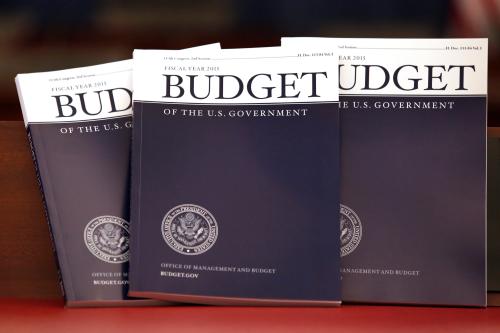The federal budget process is a costly embarrassment. Missed deadlines and government shutdowns are now the norm. Partisan brinksmanship threatens America’s international fiscal reputation and credit rating.
The real cost of uncertainty is heavy for families, businesses, and government—forcing agencies to delay contracts and hiring and putting our country’s security at risk. The Chief of Naval Operations, Admiral John Richardson, has compared constant stopgap spending to trying to win the Super Bowl while playing three quarters rather than four.
The broken budget process has also contributed to the sharp decline in respect for Congress over the years. “Dissatisfaction with government” is among the nation’s top problems, according to polling, especially when shutdowns loom. And as our Brookings colleague Alice Rivlin declared in testimony to the Senate, it is “frightening and embarrassing that the world’s most experienced democracy is currently unable to carry out even the basic responsibility of funding the services that Americans are expecting from their government….”
It’s been more than 40 years since there was a comprehensive overhaul of the budget process. Every few years Congress attempts a reform, but those efforts are usually modest, or ineffective, or the effort fizzles out. In the most recent budget deal, Congress did lay the groundwork for another attempt by creating a bipartisan and bicameral Joint Select Committee, tasked with coming up with a package of reforms for Congress to consider.
So will this latest effort succeed? It is easy to be skeptical. Nevertheless, there are at least three developments that give us reason to be more confident this time around.
The federal budget process is a costly embarrassment. Missed deadlines and government shutdowns are now the norm.
First, a number of reform ideas have been steadily honed in recent years, in hearings, publications and meetings. An example is the release this month of proposals developed under the auspices of the Convergence Center for Policy Resolution. The Convergence project brought together representatives from a wide range of interests, such as the US Chamber of Commerce, the Food Research Action Center, Americans for Prosperity, and the Veterans of Foreign Wars (blog co-author Stuart Butler was part of that project).
The Convergence group disagreed strenuously on policy goals, but agreed they would all be better off if Congress made budget decisions in a timely and more sensible way. After slowly building up trust, over several months the stakeholders agreed on a set of reforms that include bringing the President into the budget deliberations at the beginning of each Congress, producing a statutory two-year budget, helping long-term planning through a regular review of long-term commitments, and strengthening the leadership role of the budget committees. Importantly, the agreement itself sent a strong signal to lawmakers that there exists a package of reforms that can win support from a wide range of their constituents—giving political “protection” for lawmakers willing to embrace reforms.
There are several other well-developed, bipartisan legislative proposals for the Select Committee and Congress to consider. They include making greater use of portfolio budgeting, which would help orderly budgeting by putting in one place the many spending items and tax preferences affecting an area of policy, such as education, that are currently sprinkled all over the budget. There is also the idea of enacting a true long-term budget for entitlements, and better ways to budget for major investments, including infrastructure. Meanwhile, such broad-based organizations as the Bipartisan Policy Center have formulated packages of serious reform proposals.
Second, members of both parties are gradually realizing that the current process angers constituents and is not in either party’s long-term interest. With power in Congress changing hands more frequently than in the past, it’s true that parties are generally less inclined to compromise. But lawmakers of both parties also know that poorly designed budget rules will hurt them now or in the future. That recognition has caused some to talk seriously across the aisle—including Senators David Perdue (R-GA) and Sheldon Whitehouse (D-RI), both members of the new Select Committee.
The third, and perhaps most important, reason is that would-be budget reformers increasingly recognize that achieving reform requires more than well-crafted proposals—it also needs a strategy that addresses the political challenge associated with altering budgeting procedures. Proposing to change budget process rules is a bit like trying to change the rules of a team sport. Teams fear that a rule change could help one team but hurt another – maybe their team. To get agreement, all teams must work together on new rules and also see a shared benefit, such as increased game attendance. In a similar way, creating a consensus for budget process reform requires rule changes that do not favor one party’s policy goals over another. Instead, they must improve the efficiency of budgeting and assuage public dissatisfaction with Congress. The proposals from the Convergence group are among those designed to do just that.
In addition, building bipartisan acceptance for procedural or policy changes is usually more easily done outside polarized committee settings. The Select Committee offers at least the chance of a more neutral setting for crafting a new budgeting law.
In American democracy, things often have to become unacceptably bad before there is broad enough determination to rectify them. Even then, reform depends on a strategy that builds on a sense of common needs and purpose. With the reputation of Congress at such a low point, and the breakdown in budgeting hurting lawmakers politically and imposing heavy political as well as economic costs, it may now be the right time for co-operation.






Commentary
Three reasons to be optimistic about budget process reform
March 15, 2018